About Ang Thong
Established as a marine national park in 1980, Mu Ko Ang Thong National Park is an archipelago of 42 islands covering 102 km² at the shore of the Surat Thai Province east of Ko Samui in the Gulf of Thailand. The park is registered as a Ramsar site by Ramsar Convention, an international treaty for recognition of important wetlands. Many sources refer to the islands as "Angthong" which is wrong, "Ang Thong" is the correct spelling and means "golden bassin".
The islands cover 18 km² of the park, the major ones are Ko Phaluai, Ko Wua Ta Lap, Ko Mae Ko, Ko Sam Sao, Ko Hin Dap, Ko Nai Phut and Ko Phai Luak. Highest peak is located on Ko Phaluai at 396 meters asl. Islands consist mainly of rugged and steep limestone hills, sinkholes, caves and inland marine lakes. There is one nomadic village at Ko Wua Ta Lap and one other at Ko Phaluai, other islands are uninhabited.
The nearest tourist destinations are Ko Samui (~30 km), Ko Pha Ngan (~35 km), Ko Tao (~55 km), Krabi (~240 km).
The headquarters and some basic facilities are located at Ko Wua Ta Lap.
Inspired by the novel "The Beach" by Alex Garland, Ang Thong became one of the prime destinations for backpackers in Thailand when the subsequent movie starring Leonardo Di Caprio came out. While the beach scenes from the movie were filmed on Phi Phi Islands in Krabi Province, some of the film sequences were filmen in Ang Thong Islands. The jump scene from the waterfall was filmed on Haew Suwat Waterfall in Khao Yai National Park.
Wildlife
The forests consist mainly of dry evergreen forest on bigger islands, also limestone forest and minor planted mangrove forest around the beaches and bays. Among the plants, Ang Thong Lady's Slipper Orchid (Paphiopedilum Ang Thong) is an endemic species found only in Mu Ko Ang Thong National Park.
The number of reported animal species from the park is limited; according park authorities 16 mammal, around 50 bird, 14 reptile and 5 amphibian species so far found in the islands but very likely most amphibian and reptile species reported from Ko Samu and Ko Phang Nga are also found in the park. Some of the mammal species on the islands are dusky leaf monkeys, long-tailed macaques, leopard cats, fishing cats, wild boar and smooth-coated otters. Some of the bird species are collared kingfishers, white-bellied sea eagles, brahminy kites, black bazas, oriental pied hornbills, eurasian woodcocks, pacific reef herons and common hill mynas.
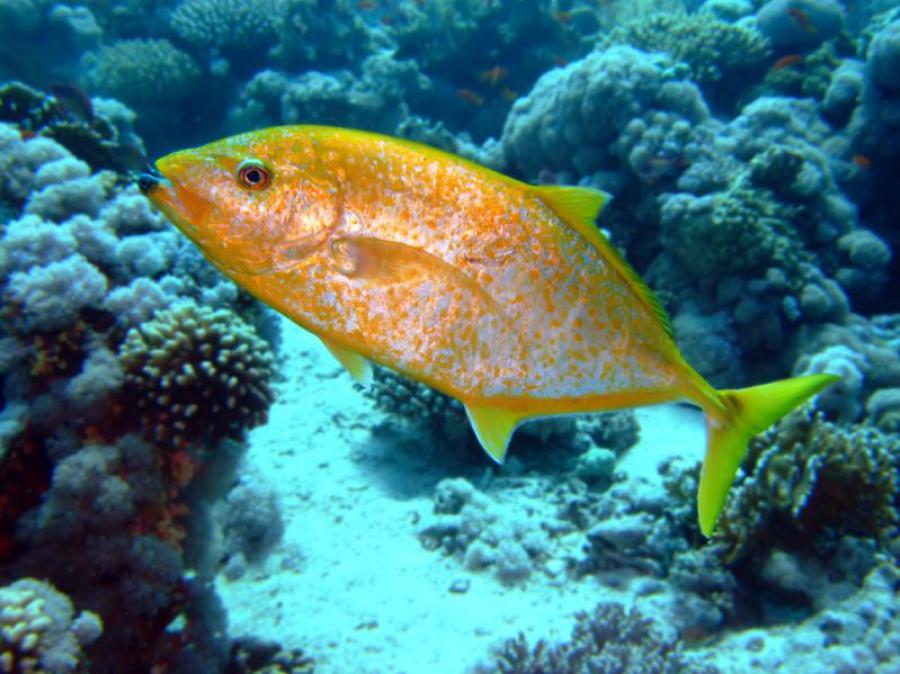
Activities
The islands and the waters around are a popular destination for day-trips from the nearby islands for snorkelling, canoeing/kayaking, enjoying the beaches, hiking and more. There are many tour companies offering both group and private tours to the islands, these can easily be arranged on arrival to the island.
There are no canoes/kayaks to rent in the Islands, they must be arranged via a tour operator.
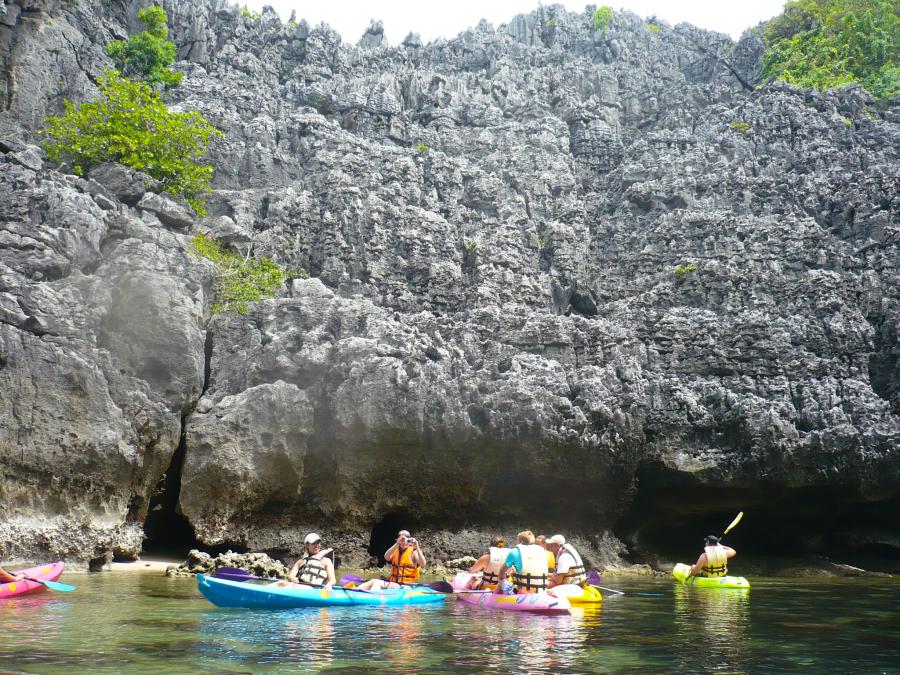
There are a few diving sites on the northern islands, more ideal for snorkeling. The average depth of the dive sites is around 10 meters with low visibility due to heavy sediment from the Tapi River on the mainland. Diving on one of the coral gardens may give an opportunity to see marine species like green sea turtles, hawksbill sea turtles and yellow-spotted trevallies. Best time for diving is February to October with best visibility around March to April.
Visiting
Getting to the park
The only way to enter the park is through licensed tour operators. The recommended way of visiting the park is to hire a tour boat in a group and decide both schedule and destinations.
Entrance fees & opening times
As of June 2022, the entrance fees are 200 Baht for foreigners (children 3-14 years pay 100 Baht) and 40 Baht (children 20 Baht) for Thai citizens.
Mu Ko Ang Thong National Park is open 8 am to 4 pm every day. The national park is closed from 20th October to 20th December every year.
Stay & eat
There are park accommodations and a campsite in Ko Wua Ta, the main island.
There are 4 park rooms at the headquarters area, two of these for 2 people and costs 600 Baht per night while the other two are for 6 and 8 people for 1,000 Baht and 1,500 Baht per night. A significant discount will apply when booked for Mon-Thu.
The accommodations can only be booked through the DNP website in advance. As the money transfer must be done within 2 days and the fact it takes a longer time with transfers from abroad, it is only possible to book from within Thailand only. Payments can be done at 7-Eleven convenience stores or banks.
There is only one restaurant in the islands, located near the visitor center. Tour operators normally include meals in their day-long tours.
Camping
It is possible to rent from the visitor center in Ko Wua Ta. Two pax tents cost 150 Baht and can be arranged from the visitor center. A set of tent accessories including a mat, a sleeping bag and a pillow cost 50 Baht per person.
Phone(s)
You are recommended to ask a Thai speaking person to call on your behalf.
- 064 642 5186 (Visitor Center)
- 077 286 025 (HQ)
Attractions of Ang Thong
Ko Wua Ta Lap
Ko Wua Talap is the main island where the park headquarters, the visitor center and other basic facilities are located. The visitor center is in Kha Bay at the northeast end of the island. There are two white beaches on the island, one at the visitor center vicinity, the other at the opposite side of the island on the west, accessible by a 700 meters long walk through the forest.
The headquarters area has park accomodations, a camping ground, a visitor center, a restaurant/shop and a ranger station.
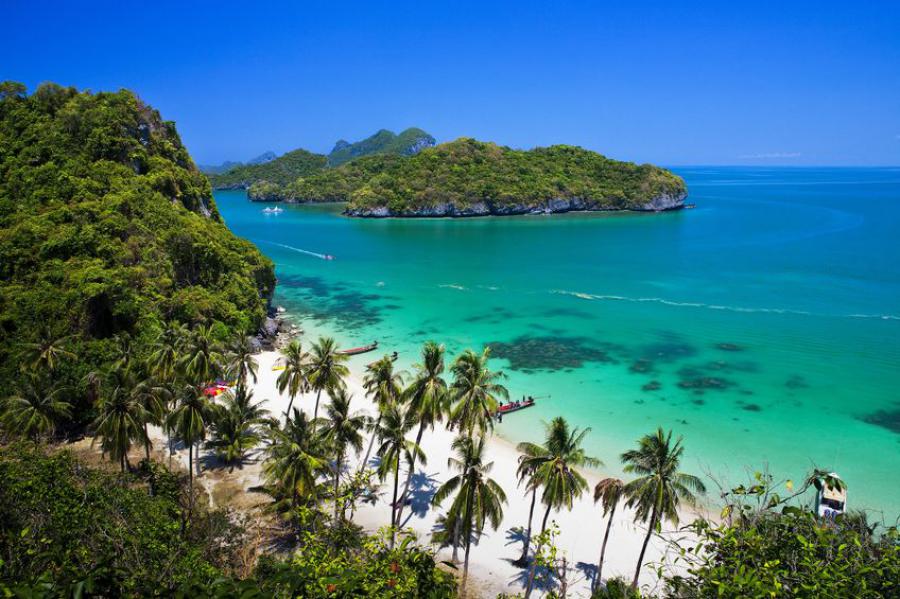
The white beach offers activities like swimming, snorkeling and canoeing/kayaking.
Wua Ta Lap Viewpoint
The spectacular panoramic viewpoint which is the main attraction of the park, accessible by a 500 meters long steep trail from the headquarters. The trail is not for faint-hearted, takes 25-30 minutes to walk, has rope for support and shows the way up. The viewpoint offers a great vista over all islands.
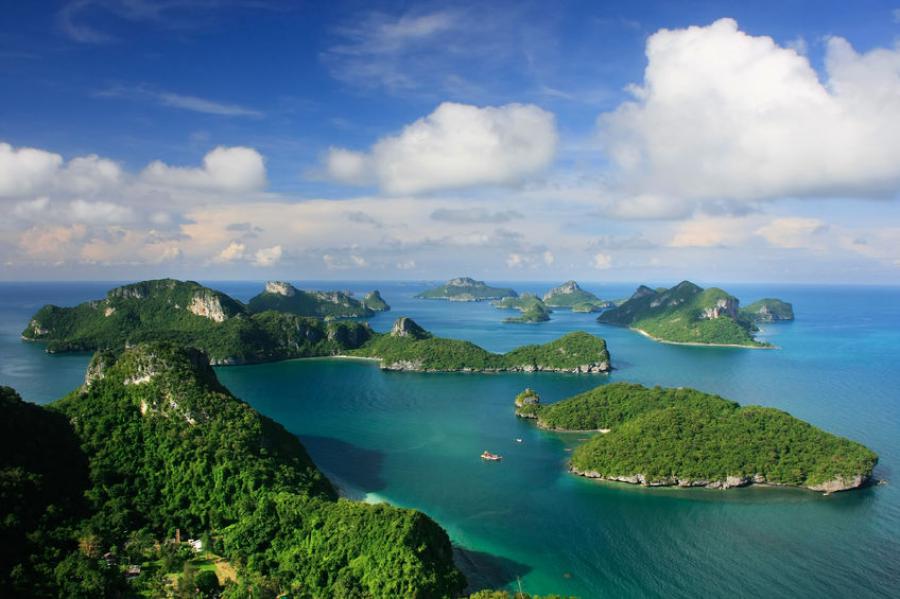
Bua Bok Cave
A cave consisting of stalagmite and stalactite formations, accessible by a 1 km long hike from the headquarters.
Ko Mae Ko
Meaning mother island, Ko Mae Ko is the island with an emerald saltwater lake called Thale Nai, connected with sea though underwater caves. A trail that takes 20 minutes to walk leads from a nearby beach to a great viewpoint over the lake. The lake is surrounded by limestone cliffs. The island also has few white beaches.
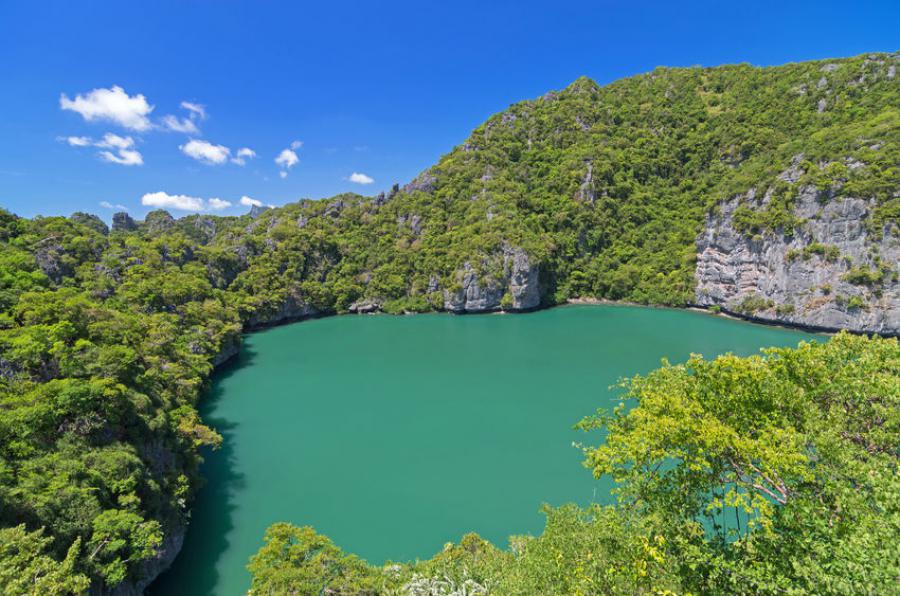
Ko Sam Sao
Situated on the east side of Ko Mae Ko, this island has several beaches, a great coral reef and a camping ground. Tents are available for rent from headquarters at Ko Wua Ta Lap only. There are no shops or restaurants on the island. The water to the showers are collected in a water tank filled with rain-water, for most time there won't be any water.
The white beach at the north end of the island has a smaller natural stone arch curving out to the sea.